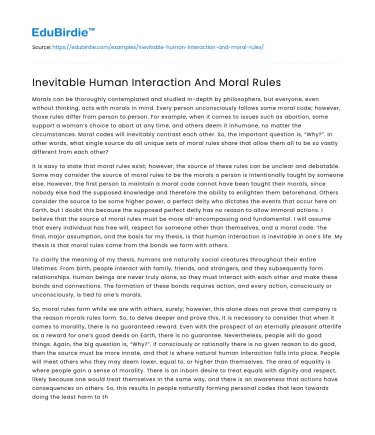Morals can be thoroughly contemplated and studied in-depth by philosophers, but everyone, even without thinking, acts with morals in mind. Every person unconsciously follows some moral code; however, those rules differ from person to person. For example, when it comes to issues such as abortion, some support a woman’s choice to abort at any time, and others deem it inhumane, no matter the circumstances. Moral codes will inevitably contrast each other. So, the important question is, “Why?”. In other words, what single source do all unique sets of moral rules share that allow them all to be so vastly different from each other?
It is easy to state that moral rules exist; however, the source of these rules can be unclear and debatable. Some may consider the source of moral rules to be the morals a person is intentionally taught by someone else. However, the first person to maintain a moral code cannot have been taught their morals, since nobody else had the supposed knowledge and therefore the ability to enlighten them beforehand. Others consider the source to be some higher power, a perfect deity who dictates the events that occur here on Earth, but I doubt this because the supposed perfect deity has no reason to allow immoral actions. I believe that the source of moral rules must be more all-encompassing and fundamental. I will assume that every individual has free will, respect for someone other than themselves, and a moral code. The final, major assumption, and the basis for my thesis, is that human interaction is inevitable in one’s life. My thesis is that moral rules come from the bonds we form with others.
Save your time!
We can take care of your essay
- Proper editing and formatting
- Free revision, title page, and bibliography
- Flexible prices and money-back guarantee
To clarify the meaning of my thesis, humans are naturally social creatures throughout their entire lifetimes. From birth, people interact with family, friends, and strangers, and they subsequently form relationships. Human beings are never truly alone, so they must interact with each other and make these bonds and connections. The formation of these bonds requires action, and every action, consciously or unconsciously, is tied to one’s morals.
So, moral rules form while we are with others, surely; however, this alone does not prove that company is the reason morals rules form. So, to delve deeper and prove this, it is necessary to consider that when it comes to morality, there is no guaranteed reward. Even with the prospect of an eternally pleasant afterlife as a reward for one’s good deeds on Earth, there is no guarantee. Nevertheless, people will do good things. Again, the big question is, “Why?”. If consciously or rationally there is no given reason to do good, then the source must be more innate, and that is where natural human interaction falls into place. People will meet others who they may deem lower, equal to, or higher than themselves. The area of equality is where people gain a sense of morality. There is an inborn desire to treat equals with dignity and respect, likely because one would treat themselves in the same way, and there is an awareness that actions have consequences on others. So, this results in people naturally forming personal codes that lean towards doing the least harm to those they consider to be their equals.
This also explains why moral rules differ so greatly from person to person. Different people have different relationships, influences, and interactions, and so, they develop different views as to who they deem equal to themselves. This affects how and to whom they display respect, the level of their concern regarding issues, their stances, and the moral rules that they stand for.
In conclusion, human relationships are at least major, if not the primary source of moral rules, and they are the very reason people do good things at all. This explanation covers the complexity of morality by tying it to a simple, fundamental concept.






 Stuck on your essay?
Stuck on your essay?

